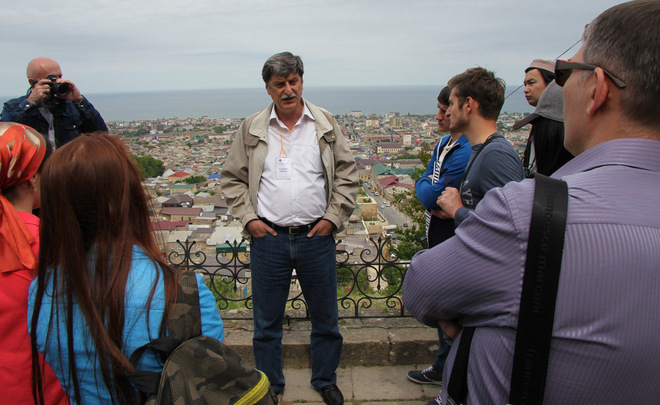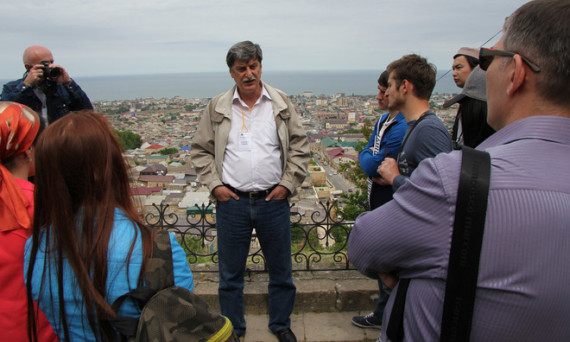A project of the TAIF Professorship, friendship between regional research schools and prospects for young talents.

In a new column, “Realnoe vremya” columnist Alfrid Bustanov talks about a form of academic collaboration—unique for our country—between scholars and students: a summer school that brought 15 young Islamic studies scholars under its wing. According to the professor, all the reports, books, conferences, and other “for show” scholarly gatherings don’t evoke such keen interest from students as this project of the TAIF Professorship.
A School for Young People
The Summer School on Islam in Russia is a project of the TAIF Professorship in the History of the Muslim Peoples of Russia, which was established in the European University at St. Petersburg’s Department of History in 2014. This project could not have been realized without a fantastic team of colleagues and teachers and the support of their home universities and colleagues in the regions.
The goal of our annual program is to create an educational platform for preparing a younger generation of researchers studying the history and current state of Islam in Russia and the CIS. Our summer school is oriented toward theorists and researchers as well as future practitioners who are involved with Muslims in our country. The summer school is aimed at concretizing the interests of young scholars, familiarity with the subject matter, and the methodologies of contemporary research.
Last summer, we conducted the first school in cooperation with the Resource Centre for the Development of Islamic and Islamic Studies Education at Kazan Federal University. Then, the subject matter of the summer school was focused more on contemporary issues, ideological trends, Islamic education, and gender. This year, we decided to shift the emphasis to the theory of postcolonial studies in relation to the “Eastern” periphery of the Russian Empire and the USSR. We’re interested in inter-regional relations between Muslims, means of communication, and cultural history across administrative borders. Such a focus is associated with the desire to move away from the hackneyed topic of church-state relations and to move toward the ordinary man and his experiences and tribulations in a historical perspective.
“We’re Looking for Talent!”
Dagetan is a perfect place for conducting the school, as it is a fascinating region with a rich history and famous tradition of Arabic studies
My colleagues and I decided that the best format is a mobile school that will be held in a new place each time, since our country is rich in cultural heritage and the contribution of Muslims is vibrant and visible in different regions with their own traditions—both religious and academic. We want to introduce our students to these traditions (and innovations!) Dagestan is a wholly logical place for conducting the school, as it is a fascinating region with a rich history and famous school of Arabic studies.
It was great luck that our initiative to hold the summer school in Dagestan was supported by Ziyavudin Magomedov’s charitable foundation “Peri,” which is doing a great deal for the development of science, culture, and education in the Republic of Dagestan. Indeed, our inter-regional cooperation has the goal of breaking the insularity of research schools as well as preserving them through expansion and orientation toward international academic standards.
We’re striving to announce the competition in advance so we can select the best of the best while maintaining the intimate nature of the class. It’s not our objective to gather stadium crowds or huge audiences, and so this year we selected 15 students from more than 70 applications from various cities in Russia, the United States, Kyrgyzstan, Uzbekistan, Kazakhstan, and Georgia. Our ideal student knows several languages, is motivated to independently study the history and present of Muslims in the post-Soviet space, and capable of clearly presenting these qualities in an application. Choosing from the applications was not easy: there were many worthy contenders, meaning that there is a demand for our program.
Most often, students say in their applications that they need help in identifying a research trajectory along which to move in the future. This is a common problem: there are many talented young people in universities, but there is often no one there to properly engage them. Of course we are not magicians either, but interaction at the summer school—even not so much with teachers as among other students—is bearing fruit.
What is Taught?
Our team remained largerely in place from the last summer's school but was augmented by the participation of colleagues from Dagestan who perfectly know the local context. First and foremost is Amri Shikhsaidov, a living classic in the study of history of Islam in the North Caucasus
Our aim is to move away from the “exoticization” of the Russian/Soviet material and toward the use of an analytic language that would allow us to include Islam in Russia within the broader contexts of contemporary academic research: not only and not so much politically relevant as fundamental, and demanding thorough training. Our school is part of a larger vision for preparing a new generation of young researchers open to the scientific search and seriously planning to devote their lives to scholarship. This time our classes were dedicated to the visual culture of Muslims in Russia, disputes surrounding the “Russian soul of Orientalism,” the tradition of Arabic calligraphic manuscripts in Dagestan, and epigraphic monuments.
As in the previous summer school, we sought to combine regional studies with those approaches and perspectives that are practiced in the contemporary international (mainly English-speaking) academic environment. That explains our decision this year to try to hold one class fully in English and to actively use English-language literature in discussions. In my opinion, the class went over swimmingly: our students not only listened attentively to the lecturer, but also actively participated in the discussion, asking questions and offering their own interpretations of the material. It’s obvious that this format needs to be developed within the framework of our school.
As I mentioned above, the subject matter of our summer school “Islam in Russia-2” was concerned with the study of the imperial periphery and with ways of representing Muslims. Our teaching team remained largely in place from last summer’s school, but was augmented by the participation of colleagues from Dagestan who know the local context and material well. First and foremost is Amri Rzaevich Shikhsaidov, a living classic in the study of the history of Islam in the North Caucasus. Summer school students got a brilliant tour of the Naryn-Kala fortress in Derbent from the best expert on this monument—the archaeologist Murtazali Gadzhiyev.
What’s the Benefit?
Our super task is to form a cohort of young professionals who are interested, for whom it is important and necessary to learn something new about the country we live in
The result is simple—a light in the eyes of young people. We are accustomed to banal reports about academic events: conferences for show, self-important books, and human capital remaining out of the equation. Our super-task is to form a cohort of young professionals who are interested, for whom it is important and necessary to learn something new about the country we live in. We plan to publish a small collection of our students’ papers; this is not an end in itself, however, bur rather working papers that reflect the interests and progress of our common cause. I wont hide that we believe one of the most important indicators of development to be admission to our program for the study of Islam in Russia in the European University at St. Petersburg’s Department of History. But even if students for some reason don’t come to us, we all the same include everyone in our close-knit circle, exchange of information, consultations, and some joint projects. I am sure that this format of work will bear fruit. Our summer school will certainly serve as a form of long-term investment in human capital in the regions of Russia and the CIS.
And below, of course, are a couple of anonymous reviews from summer school participants:
- “The Summer School on the History of Islam in Russia-2 is a very interesting and in a way even unique educational event. In my view, such platforms for progressive exchange can serve to mend cooperation between regional schools, overcoming their insularity. I think that in the future in such Islamic studies schools it might be possible to invite more foreign students for a broader exchange of opinions.”
- “…The Summer School ‘Islam in Russia-2’ is not just study, but is also pleasant acquaintance with equally pleasant people. In this school I discovered a lot that was new and interesting. I made new friends. I hope the school continues giving knowledge to its students that will be very useful in the future! All the teachers sincerely wish everyone all the best in their difficult but very important work!”
Alfrid Bustanov is the TAIF Company Professor in the History of the Muslim Peoples of Russia at the European University at St. Petersburg.
- Academic degree: Doctor of Philosophy (PhD, University of Amsterdam).
- Research interests: the history of Islam in Northern Eurasia, Eastern Studies in Russia and the Soviet Union, Tatar history and literature.
- Graduated from the Omsk State University (Department of History) with honors in 2009 and completed his graduate studies in the Department of East European Studies at the University of Amsterdam in 2013.
- Author of five monographs in Russian, Tatar, and English, and around 40 scholarly articles.














